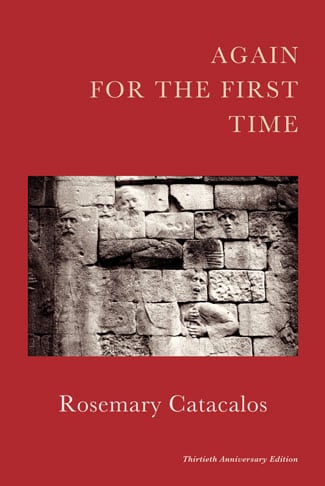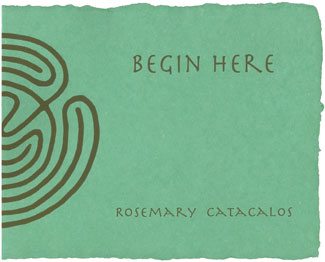
Poems New and Old from Texas Poet Laureate Rosemary Catacalos
2013 Texas Poet Laureate Rosemary Catacalos, a longtime San Antonio resident of Mexican and Greek heritage, makes frequent use of the Ariadne myth in her 1984 book, Again for the First Time, originally published in 1984 and recently reissued by San Antonio’s Wings Press in a 30th-anniversary edition. This seems a helpful entry point into Catacalos’ multi-layered, enigmatic, tense work, which constructs various models of femininity and attachment only to quickly eradicate them. The same sensibility of provisionality and revision is evident in Catacalos’ lovely new chapbook, Begin Here—also issued by Wings Press in 2013—which contains only 10 new poems but has the weight and feel of a much longer work of great complexity.
Ariadne was famously abandoned by Theseus—whom she had helped to escape from the Minotaur’s labyrinth with the help of her thread—on the island of Naxos, from which she was rescued by the god Dionysus, who promptly fell in love and married her. In Greek mythology, the ideal of femininity is often embodied in the endlessly patient help-mate, though her sacrifice generally results in no great exaltation for the woman. There are few instances of women in ancient mythology who see their perseverance rewarded, and variant interpretations of Ariadne’s fate cast doubt on whether Dionysus really married her at all.
In “Ariadne Seven Years Later,” from Again for the First Time, Catacalos seeks to imagine Ariadne’s condition as she waits abandoned on Naxos, and hers is a plaintive cry to Theseus against the patriarchal presumption that the suffering of women amounts to less than that of men: “Even now / when he [the Minotaur] gores me deep, decorating his wedding crown / with my blood. Even now when he tries to root out / my heart, that imperfect chalice, and offer it back / to my father in some kind of unholy tribute.” Patriarchy, manifest in the male hero who takes precedence in narratives of effort and accomplishment, is inescapable, and Catacalos gives voice to female abandonment in many different registers.
In many of Catacalos’ poems, women’s labor is deconstructed in ways that give it a spiritual quality, thereby saving it from anonymity and grief. In “Again Ariadne,” Catacalos writes about the heroine’s thread: “To make / this love I give / a fit cloth for the world, / something to wear proudly.” This spiritual infusion is all the more resonant in light of the modern meaning of “Ariadne’s thread”: the exploration of all possible logical paths toward the solution of a problem.
Similarly, in “Demeter Speaks After a Long Silence,” the goddess associated with harvest addresses the gardener in terms that overturn the relationship of dependency and mastery between god and human, crediting the gardener with bringing her “these words / I had almost forgotten, / this life that had almost stopped.”
Catacalos’ work is informed by mythology in ways that seem at odds with standard poetic practice today. These influences operate not as inert showpieces, but as live observations on the nature of time and mortality, emphasizing the spiritual ecstasy inherent in ordinary experience. Indeed, in “Museum Piece,” Catacalos turns an encounter with the poet Kenneth Koch in Galveston into a meditation on the timelessness of “the famous Greek light.”

by Rosemary Catacalos
Wings Press
36 pages; $25.00
The poems in Begin Here typically consist of much longer lines than those in Again for the First Time, and their sensibility is not the classical thesis/antithesis/synthesis performance, but a more desperate descent into the abysses of irresolvable memory and nostalgia.
In “Memory in the Makings: A Poetics” (addressed to poet Lorna Dee Cervantes), Catacalos ruminates on the relentless connectivity experienced by children of the Internet age, and what happens to the memory of solid relationships and work in such a condition: “And here we are on the purple lip of the cañon, telling and telling, and // there’s no such thing as going too near the sun.”
Where the chapbook’s lines are shorter, as in “Double-fractured Sonnets from Subway and Ferry” (one of her best poems), the relative ease of movement makes us think twice as hard about the background presence of the maze, which is always present in Catacalos’ poetry, as in “The eerie shine // of subway rails, Guillaume’s bandaged head / bobbing in the next car to boom-box jazz,” and the poem’s concluding thought that “The labyrinth needs grout.” There’s a constant tension in this poem between the swiftness of lines such as “Beatriz is my mother’s name, sweet dear / wheel of the unspoken turning a deaf ear” and the ever-present gravity of being moored in one’s historical reality, signified in lines like “Pulque thick and cloudy as / night on that ferry when we were gagged and robbed // on the way to our own christening.”
In “Red Dirt, Atascosa County, Texas,” the imposition of daily labor is transported to the stark Texas landscape, with the ultimate reward being perhaps the recollection of labor itself: “If years / later you buy red boots and set out to find the grandfather’s favorite tree, ancient / broad liveoak standing alone in the middle of the widest field in all sixteen / acres meant to save us.”
Perhaps no other poem summarizes Catacalos’ sensibility better than the excellent “David Talamántez on the Last Day of Second Grade,” wherein the young student is marked down for every deviation from correct behavior, only to cross “out the teacher’s red numbers and … [write] in huge letters, / blue ink, Yes! David, yes!” Enforced passivity is here applied to children instead of women, but the argument for spiritual escape is the same.
I’m glad to have discovered this complex poet, who, to our good fortune, has at last found a stage—Poet Laureate of Texas—large enough for her ambitions. She has tremendous skill in bringing mythical resonance down to earth, and in imbuing the landscapes she describes with a heroism that subtly counters patriarchal divisions between male protagonists and all the others. Her work will last.


